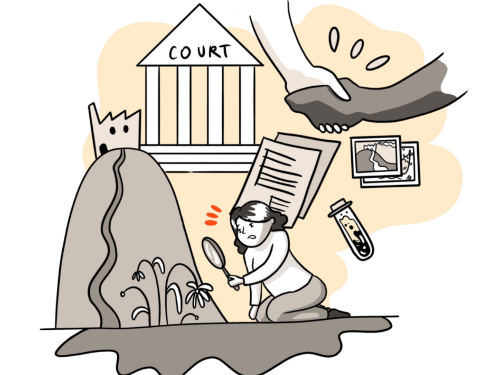"Civic environmental monitoring" is the use of monitoring devices (like sensors) or human senses (like smell) by citizens to detect environmental issues. It is a powerful source of evidence for law enforcement, since it helps to signal unaddressed demands from citizens to institutions.
Currently, it is influencing the governance of environmental issues and contributing to strengthen the provision of public services. As a consequence, this can make official governance inclusive in relation to civic actors and more responsive to local concerns.
The study of civic monitoring initiatives can help understand specific contexts and how and why people perform monitoring, alongside with the impact their monitoring has on institutional decisions and interventions
Sensing for Justice
The Marie Skłodowska-Curie Actions and formerly the Dutch Research Council funded the “Sensing for Justice” (SensJus) project, hosted by the JRC within the INNPULSE project from 2020 to 2023.
It explored how citizen-gathered evidence can support law enforcement, in particular in the environmental field, looking at civic environmental monitoring as a constructive way to contribute to the provision of public services.

The key results of the project include:
- Civic monitoring is a powerful source of evidence for law enforcement
- Action in court through civic evidence can signal unaddressed demands
- The emersion of a spontaneous civic environmental monitoring initiative indicates the potential presence of distrust but can also be an occasion for cooperation between citizens and authorities on a shared issue
- Civic environmental monitoring is also contributing to the provision of public services. Embracing these practices can be an opportunity for authorities to make governance models more inclusive and responsive
- Performing civic environmental monitoring should be recognised as a rightful contribution to official enforcement of environmental law
You can find those key results summarised in a Science for Policy Brief.
SensJus adopted an engaged methodology combining literature review and legal analysis with ethnography, and aimed at bringing its research topic closer to interested communities, using experimental communicative methods including graphic novels, sensorial experiences, theatre performance and story-telling.
As the research also addressed participants with low literacy level, standard consent forms were not meaningful for the aim of achieving an aware participation and informed consent from participants. Therefore, the project produced, together with an artist, consent forms that combine visuals and accessible text.
The forms are available as non-commercial creative commons resources for any researcher that may want to use them, in four languages, i.e. English, Italian, French and Spanish. Everyone can join our efforts and translate the forms into their language. An editable version of the form is available here:
These forms are under a CC BY 4.0 - Creative Commons Attribution Licence. If you use the forms, please give credits to The Sensing for Justice project - Marie Skłodowska-Curie Individual Fellowship n. 891513.
Awards and recognitions
Multiple actors and venues recognized the scientific, social and policy impacts of SensJus:
- In 2023, Anna Berti Suman (SensJus’ principal researcher) won the European Commission JRC Young Scientist Excellence Award for "Spearheading (environmental) sensing for justice".
- The same year, SensJus was shortlisted in the category of "Citizen-oriented delivery" at the European Ombudsman Award for Good Administration.
- It also featured in the "#SHEU LEADS’ campaign" launched by Commissioner Gabriel for Innovation, Research, and Culture.
- The project also received three honorary mentions in 2023: at the EU Citizen Science Prize at the STARTS Prize for Science, Technology & the Arts and at the Marie Skłodowska-Curie Actions Social Impact Award.
- In 2022, SensJus was chosen as "Breakthrough of the Year", in the Science Engagement category of the Falling Walls contest, Berlin for "Breaking the walls to civic evidence of environmental harm".
- Also that year, SensJus graphic novel was selected for the Bioeconomy Creative Competition and featured at the Bioeconomy Conference exhibition in Brussels in October 2022.
- The project featured in several media outlets including the scientific journal ‘Nature’ with an interview on the “Civic sentinels”.
Contact
You can contact the SensJus project through its direct channels if you have any doubt, suggestion or remark.
You can also become a civil sentinel and join the conversation by filling out the SensJus form.


